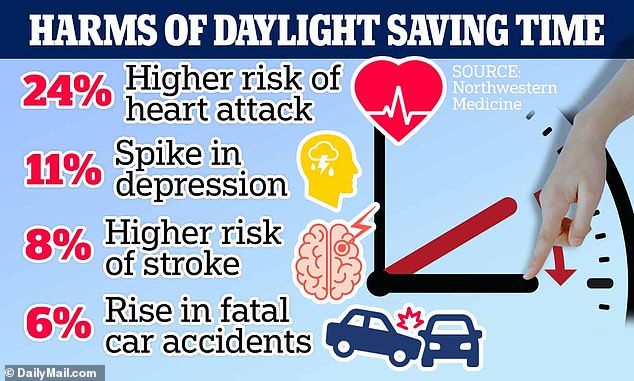Clock changes are causing a rise in cancer, road accidents and sleep problems, experts warn – as they call for daylight saving time to be scrapped altogether
With the clocks going back this Sunday, many will be looking forward to that extra hour in bed.
But leading sleep scientists have called for an end to daylight saving time (DST), amid fears it could fuel a rise in cancer, road accidents and sleep problems.
For the first time in the UK, experts from the British Sleep Society have published a position statement calling for the abolition of the biennial clock change.
The practice was first introduced in 1916 in an attempt to improve staff productivity by making the most of daylight hours during the summer months.
It means that the clocks go forward one hour on the last Sunday in March at 1 a.m. and back one hour on the last Sunday in October at 2 a.m.
The argument is that as the days get longer, shifting our schedules allows people to get more hours of sunlight during their workday.
But the Society is calling for the restoration of permanent standard time (Greenwich Mean Time), based on scientific evidence highlighting the negative consequences of changing the clocks.
With the clocks going back this Sunday, many will be looking forward to that extra hour in bed. But leading sleep scientists have called for an end to daylight saving time (DST), amid fears it will cause a rise in cancer, road accidents and sleep problems.
Losing an hour of sleep as the clocks go forward can leave the entire population feeling more tired than normal.
Some studies have suggested that the risk of fatal traffic accidents increases by about six percent after the switch to daylight saving time in the spring.
There is also evidence of an increased risk of cardiovascular events, an increased risk of suicidal behavior and increased mortality in the days after changing our clocks.
Meanwhile, our bodies depend on the bright morning sun to keep our body clocks aligned with the normal 24-hour solar cycle.
There is a growing – although somewhat controversial – body of evidence that a mismatch between the sun and our bodies can have serious long-term health consequences.
Studies have shown that those who live in the western part of a time zone – where the discrepancy between solar time and our body clocks is greatest – are at greater risk of leukemia, stomach cancer, lung cancer and breast cancer.
Because this mismatch is very similar to the mismatch that occurs when the clocks go forward, some scientists say daylight saving time could have a similar impact.
The British Sleep Society’s perspective emphasizes that sleep is crucial to health and wellbeing and that the forced changes can disrupt our ability to regulate our sleep.

Losing an hour of sleep as the clocks go forward can leave the entire population feeling more tired than normal
“What we often don’t realize is that daylight saving time changes our schedules, moving them forward an hour while daylight stays the same,” said co-author Eva Winnebeck of the University of Surrey.
“Daylight saving time forces us all to get up an hour earlier and go to work or school. In seasons with less daylight, like now in the fall, this means most of us have to get up and commute in the dark.”
The Society states that natural daylight in the morning is crucial for keeping our body clocks in line with day and night, which is essential for optimal sleep and overall health.
“Some people even advocate switching to daylight saving time all year round, but we see this as a misguided idea,” said co-author Professor Malcolm von Schantz from Northumbria University.
‘Mornings are the times when our body clocks are in greatest need of light to stay in sync.
‘At our latitudes there is simply no extra daylight to spare during the winter months, and given the choice between natural light in the morning and natural light in the afternoon, the scientific evidence favors light in the morning.’
While other sleeper companies have also advocated a return to year-round standard time, this position statement is the first published UK perspective.
The British Sleep Society, which is dedicated to the study of sleep and sleep disorders, published its recommendation in the Journal of Sleep Research.
